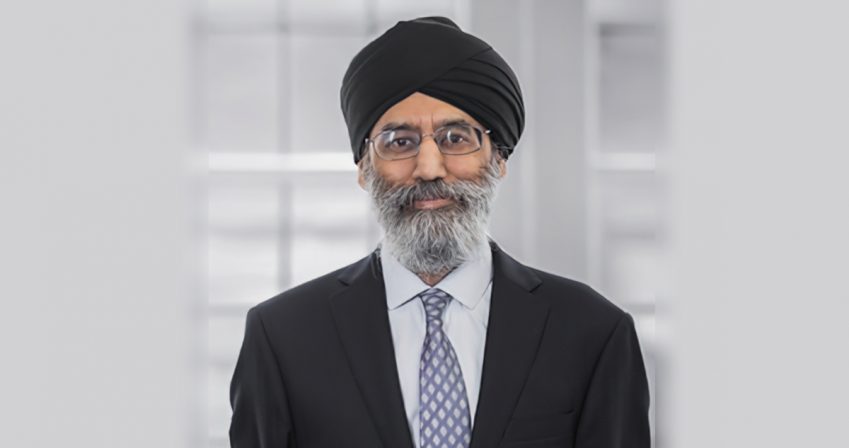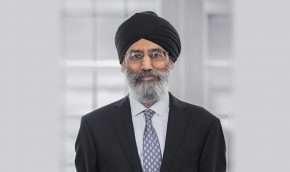Assisted in the transformation of the Bar by promoting legislation prohibiting race discrimination against barristers.
Celebrating Diversity at the Bar
- Introduction
- Diversity Timeline
- Edward Akufo-Addo
- Obafemi Awolowo
- Joyce Bamford-Addo
- Solomon Brandaranaike
- Charlotte Boaitey-Kwarteng
- Joseph Ephraim Casely Hayford
- Eugenia Charles
- S Chelvan
- Thomas Morris Chester
- Learie Constantine
- Edward Cragg Haynes
- Patricia Dangor
- Coomee Rustom Dantra
- Gifty Edila
- Ezlynn Deraniyagala
- Taslim Olawale Elias
- Martin Forde
- Arthur Dion Hanna
- Ma Pwa Hmee
- Alexander Isbiter
- Sibghatullah Kadri
- Seretse Kharma
- Moleleki Didwell Mokama
- Tunde Okewale
- Ashitey Ollennu
- Vallabhbhai Patel
- Lily Tie Ten Quee
- Ponnambalam Ramanathan
- Edward Richards
- Khushwant Singh
- Manjiit Singh Gill
- Teo Soon Kim
- Leslie Thomas
- Stella Thomas
- Leonard Woodley
Home › Celebrating Diversity at the Bar › Manjiit Singh Gill
Manjit Singh Gill QC
Call 1982, Gray's Inn
Manjit was born in Delhi. In 1966, he arrived as a child in Smethwick, a suburb of Birmingham, just two years after it had been the scene of the infamous 1964 election in which race first became an explosively overt issue in a British election and one year after Malcolm X had visited the area to see the impact of race on housing. After attending the almost entirely white local grammar school, and later attending University College, London, he was called to the Bar in 1982. He trained with leading lawyers in particular Stephen Sedley QC (later Sedley LJ). But tenancies in established chambers were hard to find for ethnic minority barristers. Apart from two senior barristers and one circuit judge, Manjit was the only other turban-wearing Sikh barrister at that time. After a short spell in a common law chambers, he joined a radical chambers whose young members pursued an uncompromising anti-discriminatory approach to the law, with an emphasis on protecting the disadvantaged.
From the mid-1980s, Manjit was part of the executive committee of the Society of Black Lawyers which lobbied the Bar Council and the Government on matters such as changing the Bar’s code of conduct to prohibit race discrimination, legislation prohibiting discrimination against barristers, multi-racial juries, and other topics, at a time when black and Asian barristers mostly practised outside the ‘mainstream’ chambers. In the 1990s he was part of a small group that set up the Discrimination Law Association and another group that set up the Education Law Association. In 1992, he was appointed as a junior on the first fully formalised panel of Crown counsel, a position for which he had not applied and which he only accepted on the basis that the Crown should pursue an anti-discriminatory approach in briefing policy. He was told no one had ever asked this, but they still appointed him. In 1997 he was in the first batch of counsel appointed as special advocates. In 2000 he was appointed Queen’s Counsel at the age of 39. In 2001 he co-led a NGO delegation to the UN World Conference against Racism in Durban, which achieved the insertion of a clause in the resulting Declaration protecting from discrimination persons whose identities are drawn from multiple characteristics.


Manjit Singh Gill QC
He has conducted cases in the European Courts and numerous cases in the House of Lords and Supreme Court in public law, human rights and immigration, including some of the most important constitutional law cases such as the Belmarsh case on the indefinite detention of suspected terrorists without trial, the first case on control orders for detaining suspected terrorists, ZH (Tanzania) which changed the legal landscape for every field of law on the best interests of children, the exclusion of judicial review (Cart), the Article 50 Brexit case (Gina Miller No 1), and many others successfully challenging governmental policies against migrants such as constraints on their right to marry in the UK, conditions for their exercise of family life in the UK, the treatment of the children of persons formerly entitled to British Citizenship, and the deportation of foreign criminals.
In 2010 he joined No5 Chambers and was appointed a Master of Gray’s Inn. Since 2011 he has been chair of the expert panel of the Strategic Legal Fund, which promotes strategic litigation on issues affecting migrant communities. From 2012 to 2021 he was a (honorary) professor at Birmingham University. He is a patron of the Migration Museum. He continues relentlessly to pursue strategic cases on behalf of disadvantaged groups.